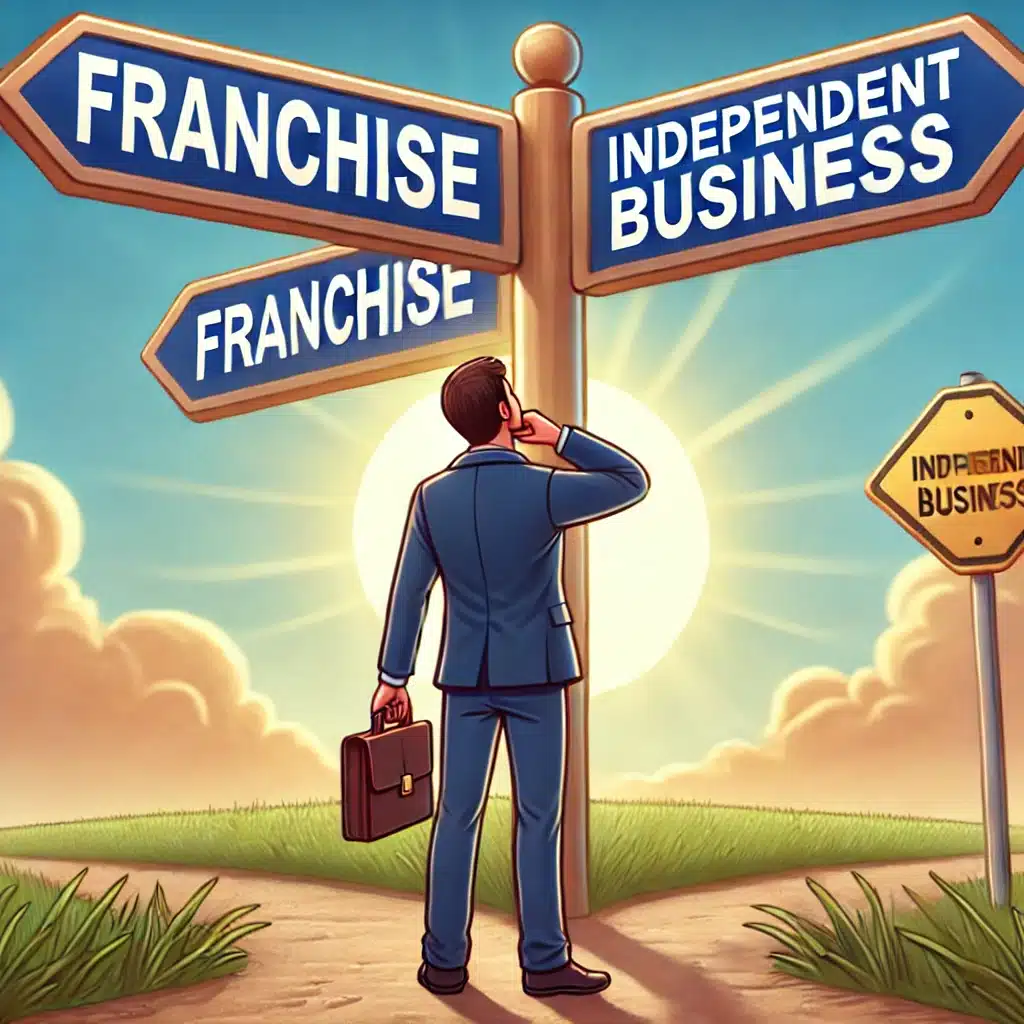Buying a franchise means skipping the toughest part of starting a business. You get a ready-made brand, proven systems, and support all bundled together.
But is it as easy as it sounds? Or do franchises have hidden challenges that could trip you up, along the way? We’ll cover all that in this blog, plus some extra.
What is a franchise?
The franchise is a business model where you (the franchisee) buy the rights to open and operate a business under an established brand. The parent company (franchisor) provides you with everything you need to run the business, which includes training, marketing, and a proven operational model. In exchange, you pay an initial franchise fee and ongoing royalties (in some cases.)
Why is it a successful business model? Because instead of starting from scratch, you’re stepping into a business with a recognised name and a track record of success. But the real question is: does buying a franchise guarantee your success? Or is it a good idea in the first place.
The benefits of buying a franchise
Brand recognition
Franchise comes with one of the biggest advantages – instant brand recognition. When people walk into Subway or McDonald’s, they already know what to expect. This advantage saves you years of building a customer base from the ground up.
Proven business model
When buying a franchise, you’re not just buying a business; you’re buying, a roadmap for how to run it successfully. The owner, of the company has already worked out the kinks and perfected a system that you’ll follow. A proven business model means a small learning curve and risks of making costly mistakes.
Support and training
Most franchisors provide training and ongoing support because they want you to succeed. When you’re successful, they are successful. You can ask for guidance on day-to-day operations or marketing strategies, from experts. Franchisors also act as mentors, which can be a huge advantage, especially if you’re new to running a business.
Easier financing
Franchise businesses easily get financed. Banks view franchises as less risky than independent startups because they come with, an established business model. The brand’s reputation can go a long way in convincing lenders that you’re a safe bet.
The challenges and risks
High initial investment and ongoing fees
Having access to a recognisable brand comes with a cost. The initial investment in a franchise may range from a couple of thousand dollars to millions depending on the brand. Plus, you may be required to pay ongoing royalties and marketing fees from your profits.
Limited control
Franchising is a great idea for someone with money and skills to manage a business, but if you are someone, who loves innovation, and wants to put your spin on things, franchising might not be the best fit. All Franchises, come with strict guidelines on how the business must be run, from decor to the products sold. This leaves only a little room for creativity. This lack of flexibility would be frustrating, for entrepreneurs who want more control over their business.
Market saturation
Let’s face the truth — buying a franchise doesn’t always guarantee success. If the market is already saturated with the same brand, you could find yourself competing with franchisees, nearby. This is particularly true with popular fast-food and retail chains.
Franchise vs buying an existing independent business
Since a franchise business is not always a hunky dory, you might also think of buying an independent business. Let us tell you —- It’s not a bad idea.
Take, for example, a bakery. If you buy the franchise of a well-known bakery chain, you’re getting an established name, a loyal customer base, and detailed instructions on how to run the business. But you’ll also be limited in terms of creativity. Maybe you can’t add your signature pastries or change the layout, of the shop.
On the other hand, if you buy an existing independent bakery for sale, you’ll have full control over the direction of the business. You could revamp the menu, adjust pricing, or even rebrand the entire store.
Verdict: If you prefer to play it safe with a well-established system, a franchise, is a good option. But if you want more control and are willing to take on greater risk, purchasing an existing independent business might be the way to go.
Final Thoughts
Stepping into the business world through a franchise model can be a great way to enter the world of business ownership with a solid foundation and built-in support. It has a 15% failure rate, which is very low compared to startups. But it’s not without its challenges.
Whether a franchise business is right for you, largely depends on your personal goals, financial situation, and willingness to follow someone else’s playbook.
FAQs About Buying a Franchise
What is a franchise?
A franchise is a business model where an individual or group (the franchisee) purchases the rights to operate a branch of an established company (the franchisor). The franchisee uses the brand, systems, and products of the franchisor, following set guidelines in exchange for fees and royalties.
Is buying a franchise a good investment?
Buying a franchise can be a profitable investment, but it depends on the franchise, location, and market demand. Successful franchises offer brand recognition and established business models, making them less risky than starting a business from scratch. However, initial costs and ongoing fees can be high, so it’s important to research and assess financial viability.
How much does it cost to buy a franchise?
Franchise costs vary widely depending on the brand and industry. The initial franchise fee can range from $10,000 to $1 million or more. Additionally, franchisees must consider other expenses, such as real estate, equipment, marketing, and royalty fees, which are typically a percentage of sales.
What are the advantages of buying a franchise?
- Brand recognition: Franchises operate under well-known brands, making it easier to attract customers.
- Proven business model: Franchisees follow an established model with set operations and guidelines.
- Support: Franchisors typically offer training, marketing support, and ongoing assistance to help franchisees succeed.
- Lower risk: Compared to starting a business from scratch, franchises provide a blueprint for success, reducing startup risks.
What are the disadvantages of buying a franchise?
- High initial investment: Franchise fees, royalties, and operational costs can add up quickly.
- Limited control: Franchisees must adhere to strict operational guidelines, limiting creativity and flexibility.
- Ongoing fees: Franchisees must pay royalties and marketing fees, typically a percentage of their revenue.
- Dependence on franchisor: If the franchisor experiences issues (e.g., brand damage), franchisees are impacted.
How do I choose the right franchise?
When choosing a franchise, consider the following:
- Industry: Select an industry you are passionate about or have experience in.
- Brand reputation: Research the franchisor’s reputation and track record of success.
- Costs: Ensure the initial investment aligns with your budget and financial goals.
- Support: Evaluate the franchisor’s training and ongoing support.
- Market demand: Assess whether there’s demand for the franchise in your target location.
Do franchises provide training and support?
Yes, most franchisors offer comprehensive training and ongoing support in areas such as operations, marketing, and customer service. This helps ensure franchisees have the knowledge and resources needed to run their businesses successfully.
Can I sell my franchise?
In many cases, franchisees can sell their franchise. However, the franchisor may have specific guidelines and approval processes for the sale. It’s important to check the franchise agreement for resale terms and conditions.
How long does it take to break even in a franchise?
The time to break even varies depending on the franchise, industry, and location. On average, franchisees can expect to break even within 1 to 3 years, though this timeframe depends on factors such as market conditions, management, and initial investment.
Is buying a franchise a good idea for beginners?
Franchises can be a great option for beginners due to the structured support system, training, and brand recognition they offer. However, it’s still important for beginners to carefully evaluate the franchise, understand the costs involved, and be prepared to manage a business effectively.




